Art and Sustainability
-
Initiated by Luk Bouckaert (KU Leuven) and Knut Ims (NHH Norwegian School of Economics, Bergen) the European SPES Institute organizes The Schweitzer Workshop in cooperation with ABC Climont in September 15-18, 2023 in Climont, France. The aim of the workshop is to recontextualize Albert Schweitzer’s eco-oriented ethics for our time - the Anthropocene. Albert Schweitzer formulated an experience-based foundation for ethics based on the principle Reverence For Life (Ehrfurcht vor dem Leben), and that he hereby contributed to a pioneering eco-ethics that should be brought up to date for our time. Schweitzer’s philosophy implies a new sense of authenticity no longer based on the modern ego-centric notion of autonomy but on the alter-centric notion of reverence for life. This foundational principle is conceived as an unconditional and inclusive respect for life in all its manifestations.
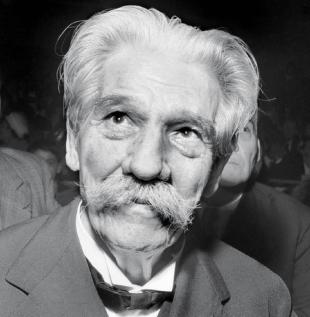
See program of the workshop as enclosure.
-
The University of Urbino “Carlo Bo” organizes the 2022 Annual European SPES Conference in May 19-21, 2022 in Urbino, Italy. The conference aims to contribute to the ecological transformation of humankind by exploring theoretical and practical models that integrate the sense of the place, ethics and spirituality in new ways of organizing of economic and social life.

-
Laszlo Zsolnai gave a lecture in the “Happiness Talk Series” of Rekhi Centre for The Science of Happiness at the Indian Institute of Technology, Kharagpur on October 30, 2021. He introduced the Western (Aristotelian) and the Eastern (Buddhist) conceptions of happiness and discussed the contemporary approaches to wellbeing. He argued that the purpose of the firm should be redefined. Instead of maximizing profit, firms should maximize the wellbeing of all the stakeholders. He presented cases of successful working models of wellbeing oriented organizations.
-
The Princeton University Faith and Work Initiative, the European SPES Institute – Leuven, and the Business Ethics Center of Corvinus University of Budapest jointly organize a webinar series on Humanities for Business in 11–15 October 2021.
The program presents the grand traditions of the Humanities as an untapped resource for business-world problems. In a time where the Humanities are viewed as in decline or in threat of collapse altogether, the webinars will enact and extend the best of the Humanities toward prevailing challenges within the complex realities of our current cultural moment. Topics include values, trust, responsibility, ethics, leadership, self-realization, spirituality, narrative, literature, music, and the arts in relation with and applied to current business challenges.
-
SPES Pre-Conference Online Workshop: Nurturing the Place and its Communities, May 20, 2021.
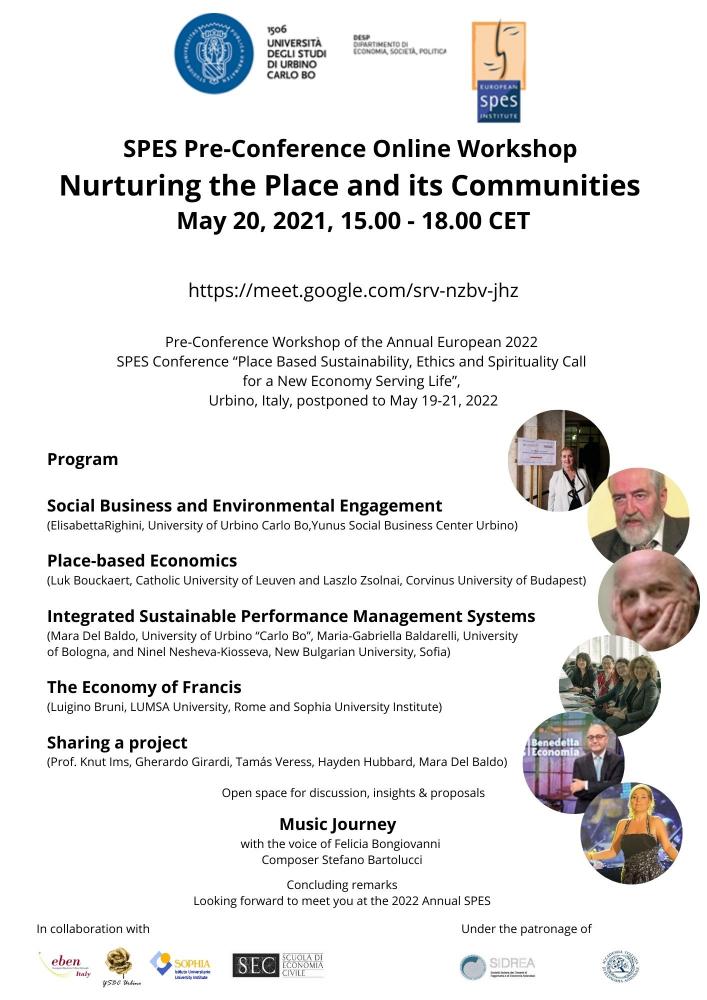
-
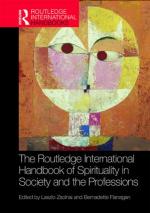 Increasingly, it is being recognized that spirituality, defined here as "a multiform search for a transcendent meaning of life that connects them to all living beings and brings them in touch with God or ‘Ultimate Reality,’" is an aspect of almost every sphere and aspect of social life. It appears in humanity’s dealings with nature, home and community, healing, economics and business, knowledge, and education. The Routledge International Handbook of Spirituality in Society and the Professions is a stimulating collection that summarizes the most important issues, frameworks, discussions, and problems relating to spiritually inspired activities in different fields of social life.
Increasingly, it is being recognized that spirituality, defined here as "a multiform search for a transcendent meaning of life that connects them to all living beings and brings them in touch with God or ‘Ultimate Reality,’" is an aspect of almost every sphere and aspect of social life. It appears in humanity’s dealings with nature, home and community, healing, economics and business, knowledge, and education. The Routledge International Handbook of Spirituality in Society and the Professions is a stimulating collection that summarizes the most important issues, frameworks, discussions, and problems relating to spiritually inspired activities in different fields of social life. -
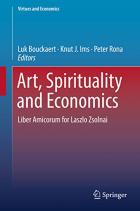 This volume celebrates the work of Laszlo Zsolnai in the field of the ethical and spiritual aspects of economic life, who has made significant contributions to the connection between ethics, spirituality, aesthetics and economic theory. The book offers a selection of essays concerned with the ethical, spiritual and aesthetic context within which economics as a social studies discipline should be situated in order to avoid the sort of dehumanizing consequences that theories based on utility maximization and rational choice necessarily entail.
This volume celebrates the work of Laszlo Zsolnai in the field of the ethical and spiritual aspects of economic life, who has made significant contributions to the connection between ethics, spirituality, aesthetics and economic theory. The book offers a selection of essays concerned with the ethical, spiritual and aesthetic context within which economics as a social studies discipline should be situated in order to avoid the sort of dehumanizing consequences that theories based on utility maximization and rational choice necessarily entail. -
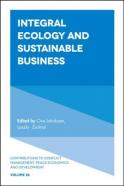 This collection addresses the relationship between business, the natural environment, ethics, and spirituality. While traditional economic theory generally assumed firms maximize profits, it has long been acknowledged that other factors may be important to understanding firm activities. The role of ethics and spirituality in society is clearly significant, yet economists have traditionally had little to say on these topics and how they intersect with economic activity.
This collection addresses the relationship between business, the natural environment, ethics, and spirituality. While traditional economic theory generally assumed firms maximize profits, it has long been acknowledged that other factors may be important to understanding firm activities. The role of ethics and spirituality in society is clearly significant, yet economists have traditionally had little to say on these topics and how they intersect with economic activity. -
Laszlo Zsolnai and Doirean Wilson published a paper on art-based business. Their paper argues that with its exclusive focus on profit-making, modern-day businesses tend to violate the integrity and diversity of natural ecosystems, the autonomy and culture of local communities and the chance that future generations will lead a decent life. The core of the metaphysics of modern-day business is what Martin Heidegger calls “calculative thinking”. It is contrasted with poetic thinking represented by genuine art. To preserve nature and to satisfy human needs, gentle, careful ways of undertaking economic activities are needed. The paper analyses the cases of Illy Café and Brunello Cucinelli as art-based companies to show that art can inspire business to become more aesthetic organization engaged in socio-ecological value creation and the enrichment of the quality of life.
-
The Center for Ecological Economics and Ethics of the Bodo Graduate School of Business, University of Nordland organizes the 2016 Annual European SPES Conference in May 27-29, 2016, in Bodo, Norway. The topic of the conference is „Integral Ecology, Earth Spirituality and Economics”. Pope Francis’ encyclical letter Laudato si’ (Praised Be: On the Care of Our Common Home) is an excellent opportunity for building a conversation between science and spirituality on ecology and sustainable development.
